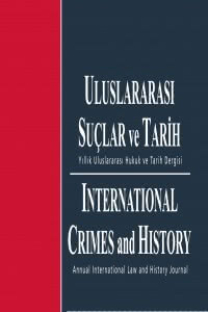BİRİNCİ DÜNYA SAVAŞI, ULUSLARIN KENDİ KADERLERİNİ TAYİN HAKKI VE ORTA ÇAĞHUKUKUNUN MİRASLARI
Uluslararası hukuktaki, ulusların kendi kaderlerini tayin edebilmehakkının kökenleri, Orta Çağ’ın sonlarında Avrupa’da, özellikle deHıristiyan devlet egemenliği kavramlarından kısmen ortaya çıkmış vekayda değer ölçüde varlığı devam ettirmiştir. Modern uluslararasıhukuk uzmanları tarafından bu hakkın ortaçağ kökenleri genel olarakdikkate değer bulunmasa da, 19. yüzyılda ve 20. yüzyılın ilk yarısındaulusların kendi kaderini tayin etmesi, ayrıcalıklı Hristiyankavramlarından devlet kurma ve ulusal kimlik olacak şekilde yenidenşekillenmiştir. Hatta, özellikle Osmanlı yönetimi altındaki Balkantopraklarında 19. yüzyılda meydana gelen gelişmeler, önemli olmasınarağmen, yankıları 1919’da Versay’da ve sonrasında, uluslararasıhukuku geliştirebilmek için göz ardı edilmiştir
Anahtar Kelimeler:
Ulusların kendi kaderini tayin hakkı, uluslararası hukuk, Versay, Osmanlı, Balkanlar
WORLD WAR I, SELF-DETERMINATION, AND THE LEGACIES OF MEDIEVAL JURISPRUDENCE
The principle of self-determination in international law is inpart an outgrowth of particularly Christian concepts of state sovereigntythat emerged in Europe at the end of the Middle Ages, and which haveenjoyed a considerable afterlife. Even if its medieval origins are largelyunappreciated by modern scholars of international law, the principle ofself-determination was appealed to in the nineteenth and early twentiethcenturies in ways that privileged Christian concepts of statehood andnational identity. Further, this nineteenth-century experience,particularly as it unfolded in the Ottoman Balkans, had important butneglected repercussions for the development of international law atVersailles in 1919 and thereafter
Keywords:
self-determination, international law, Versailles, OttomanBalkans,
___
- Antony Anghie, “Basic Principles of International Law: A Historical Perspective,” in International Law for International Relations, ed. Başak Çalı (Oxford: 2010), pp. 46-70.
- Antony Anghie, “The Evolution of International Law: Colonial and PostColonial Realities,” in 27 (2006) Third World Quarterly pp. 739-753.
- Guido Comparato, Nationalism and Private Law in Europe (Oxford, and Portland, OR: 2014)
- Kathleen Cushing, Papacy and Law in the Gregorian Revolution: The Canonistic Work of Anselm of Lucca (Oxford: 1998).
- John Milton Cooper, Jr., Breaking the Heart of the World: Woodrow Wilson and the Fight for the League of Nations (Cambridge, 2001).
- Richard S. Horowitz, “International Law and State Transformation in China, Siam, and the Ottoman Empire During the Nineteenth Century,” in Journal of World History 15 (2004) pp. 445-486.
- Ernst Kantorowicz, The King’s Two Bodies: A Study of Medieval Political Theology (Princeton: 1957, reprinted 1997)
- Benjamin Z. Kedar, “De iudeis et saracenis: On the Categorization of Muslims in Medieval Canon Law,” in Studia in honorem eminentissimi cardinalis Alphonsi M. Stickler eds. Joseph Rosalio and Lara Castillo (Rome: 1992) pp. 207-213
- Benjamin Z. Kedar, “Muslim Conversion in Canon Law,” Proceedings of the Sixth International Congress of Medieval Canon Law (Vatican City: 1980)
- J.M. Kelly, A Short History of Western Legal Theory (Oxford: 1992)
- Ayten Kılıç, “Paved with Good Intentions: The Road to the 1877-78 Russo-Ottoman War, Diplomacy and Great Power Ideology,” unpublished dissertation (University of Wisconsin, Madison, 2012).
- J.-P. Migne, ed., Patrologiae latinae cursus completus, vol. 146 (Paris, 1884), “Alexandri II pontificis Romani epistolae et diplomata.”
- R.I. Moore, The Formation of a Persecuting Society: Authority and Deviance in Western Europe, 950-1250 (Oxford and New York: 1987)
- James Muldoon, “The Contribution of the Medieval Canon Lawyers to the Formation of International Law,” 28 (1972) Traditio 483-497.
- Knut Wolfgang Nörr, “Recht und Religion: über drei Schnittstellen im Recht der mittelalterlichen Kirche,” 79 (1993) Zeitschrift der Savigny-Stiftung für Rechtsgeschichte (KA) 1-15
- Ernest Nys, Les origines du droit international (Brussels-Paris: 1894) Bernard Papiensis, Summa Decretalium, 5.5 ed. E.A.D. Laspeyres, (Regensburg: 1860)
- Kenneth Stow, Catholic Thought and Papal Jewry Policy, 1555-1593 (New York: 1977).
- Kenneth Stow, “Expulsion Italian Style: The Case of Lucio Ferraris,” 3 (1988) Jewish History 51-63.
- Trygve Throntveit, “The Fable of the Fourteen Points: Woodrow Wilson and National Self-Determination,” 35 (2011) Diplomatic History pp. 445-481.
- E. de Vattel, The Law of Nations or the Principles of Natural Law Applied to the Conduct and Affairs of Nations and of Sovereigns, ed. Charles G. Fenwick (New York: reprint 1964)
- Francisco de Vitoria, De indis et de iure belli relectiones, ed. Ernest Nys, trans. John Pawley Bate (Washington, D.C.: 1917, reprinted from 1557 edition)
- Francisco de Vitoria, Relectio de Indis, (Madrid: 1989, reprinted from 1517 edition).
- Henry Wheaton, Elements of International Law (Philadelphia: 1836, reprint 1972)
- Patrick Wormald, The Making of English Law: King Alfred to the Twelfth Century, Legislation and its Limits, Vol. 1 (London: 1999).
- ISSN: 1306-9136
- Yayın Aralığı: Yıllık
- Başlangıç: 2006
- Yayıncı: Terazi Yayıncılık Basım Dağıtım Danışmanlık Eğitim Organizasyon Matbaacılık Kırtasiye Tic. Ltd. Şti.
Sayıdaki Diğer Makaleler
THE INTERNATIONAL REPERCUSSIONS OF THE 1876 APRIL UPRISING WITHIN THE OTTOMAN EMPIRE
THE RELOCATION AND INTERNMENT OF PEOPLE OF JAPANESE DESCENT IN THE US DURING WWII
SOSYAL BELLEK LİTERATÜRÜNÜN ELEŞTİREL BİR İNCELEMESİ: OKULLAR, YAKLAŞIMLAR VE TARTIŞMALAR
KIRIM TATARLARININ SOVYETLER BİRLİĞİ TARAFINDAN ETNİK TEMİZLİĞE MARUZ KALMASI
WORLD WAR I, SELF-DETERMINATION, AND THE LEGACIES OF MEDIEVAL JURISPRUDENCE
OSMANLI İMPARATORLUĞU’NDA 1876 NİSAN AYAKLANMASININ ULUSLARARASI YANSIMALARI
SOVIET ETHNIC CLEANSING OF THE CRIMEAN TATARS
BİRİNCİ DÜNYA SAVAŞI, ULUSLARIN KENDİ KADERLERİNİ TAYİN HAKKI VE ORTA ÇAĞHUKUKUNUN MİRASLARI
